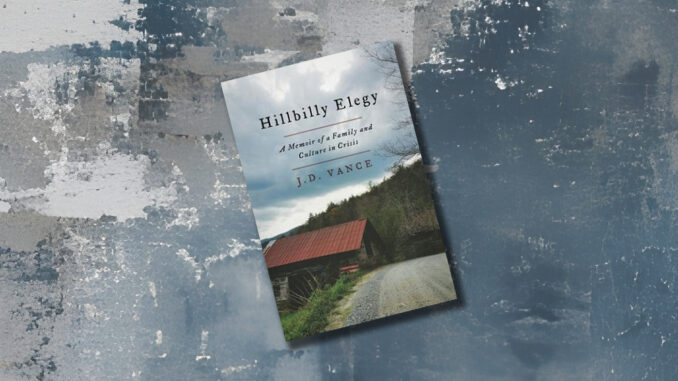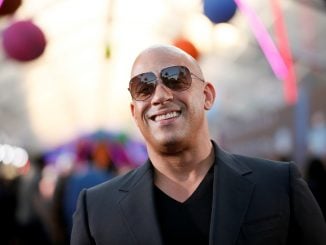
J.D. Vance’s acclaimed memoir “Hillbilly Elegy” begins in the notoriously violent Breathitt County, Kentucky. Setting the tone for his story is the historical and contemporary violence and instability of so many Scotch-Irish Appalachian backgrounds. Bluegrass fans of Ralph Stanley might recall that “Bloody Breathitt” is where one time lead singer Roy Lee Centers of Stanley’s band was murdered in the 1970s.
Vance’s story though is peculiar in that he defies the fate of so many of his contemporaries and goes on to attend Ohio State University, Yale Law School, after what is an important stint in the United States Marine Corps. Vance calls poverty “the family tradition” and is mostly raised by his mother and a string of revolving father figures attached to his mom for short stints. The stable adult figures in his life are his “Mamaw” and “Papaw” Vance, a surname he will eventually take as his own.
His grandparents left Jackson, Kentucky, to chase the middle class dream in Middletown, Ohio. Vance even mentions the “Hillbilly Highway” made famous in Dwight Yoakam’s “Readin’ Rightin Route 23.” His grandparents were part of the post-world war exodus of so many in the Appalachia region and American South who headed North for better opportunities and pay. Despite leaving, they were often deeply tied to family back home, returning often.
Vance’s grandmother was pregnant at 13 and her story is riddled too with domestic violence and instability, but she eventually settles down and offers Vance an opportunity for success. She once lit her alcoholic husband on fire. The grandparents reconciled later in life but early on violent family feuds like that were commonplace. The cycle continues on with Vance’s mother, who is eventually overcome at times by drug addiction.
Vance, who grew up in Ohio, continually leaned on his grandparents for safety and direction. His then surviving grandmother took him in and he was able to graduate high school. Vance admits merely graduating high school was no guarantee until he was offered more permanent stability in Mamaw’s home. His sister Lindsay was also a constant in his young volatile life, but Vance was devastated when he first learned she was only his half sister.
Through narrative and story, Vance is skilled in allowing the reader to see the problems that plague many broken families, and the oft forgotten White “working class” Americans who are facing tremendous economic hardship. Vance explains how the white underclass can fall through the cracks without an extended family to help stabilize a child stuck with a drug-addicted parent or shipped off to social services.
“Hillbilly Elegy” is a reminder that while government can help to solve some problems it has ultimately failed in solving the deeper cultural underpinnings of poverty. At one point he questions why he is working so hard at a supermarket when shoppers come in with fancy phones but seemingly can’t afford groceries because they are on public assistance. “I could never understand why our lives felt like a struggle while those living off of government largesse enjoyed trinkets that I only dreamed about,” writes Vance.
He describes friends that are given opportunities for respectable work and pay, yet, they often self-sabotage their advancement and end up blaming the system or the government that is “rigged” against them.
The memoir, however, is not merely a denouncement of the problems within “hillbilly” culture – Vance is in many ways proud of his hard and often violent upbringing. “Americans call them hillbillies, rednecks, or white trash,” writes Vance. “I call them neighbors, friends, and family.” He does point out though that stability and healing within that culture will require self-recognition of the problems that plague it with a “tough enough” attitude to move past the cycle of poverty and dependency.
After a law degree from Yale, Vance is now unsurprisingly successful and well adjusted. His popular memoir is a constant reminder, however, that he is the rare exception and not the rule. He is skilled too in offering a powerful voice for a segment of American society that wonders if they have not only been forgotten but if anybody cares about their plight.



